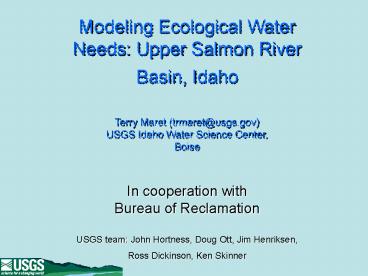Suggested Stream Prioritization Process - PowerPoint PPT Presentation
1 / 34
Title: Suggested Stream Prioritization Process
1
Modeling Ecological Water Needs Upper Salmon
River Basin, Idaho Terry Maret
(trmaret_at_usgs.gov) USGS Idaho Water Science
Center, Boise In cooperation withBureau of
Reclamation USGS team John Hortness, Doug Ott,
Jim Henriksen, Ross Dickinson, Ken Skinner
2
Studies Directed by Technical Workgroup
USBR - Joe Spinzola, Al Simpson, Ron Sutton IDFG
- Cindy Robertson, Tom Curet, Paddy Murphy IDWR -
Bill Graham, Morgan Case NOAA - Jim Morrow, Don
Anderson USFWS - Janna Brimmer USFS - Mark
Moulton, Jeb Wofford BLM - Jude Trapani USGS -
Terry Maret, Jon Hortness
3
NMFS 2000 Biological Opinion FCRPS Effects of a
Federal Action on Threatened and Endangered
Species Avoid jeopardy to the continued survival
and recovery of listed species and adverse
modification to their critical habitat Federal
requirement of sec. 7(a)(2) of the Endangered
Species Act
4
BOR Subbasin Habitat Program Address limiting
factors in selected subbasins Flow Entrainment
Channel Morphology Access Complexity Work
with Willing landowners On private land
Comply with State laws How much water is enough?
5
(No Transcript)
6
Objectives
- Compile existing hydrologic and biological data
- Characterize the hydrology of selected streams
- Identify instream flow needs to support relevant
life stages of Chinook salmon, steelhead, and
bull trout - Identify streamflow needs for passage
- Evaluate effects of diversions on water
temperature
7
HYDROLOGY
MANAGEMENT PRIORITIES
TARGET FISH SPECIES
INSTREAM FLOW PROCESS TO IMPROVE FISH HABITAT
HABITAT SUITABILITY CURVES
PERIODICITY
PASSAGE
LIMITING FACTORS WATER QUALTIY AND TEMPERATURE
PHABSIM RESULTS
FISH FOOD PRODUCTION
8
PHABSIM (Physical Habitat Simulation Model)
- PHABSIM is a collection of computer models and a
major component of Instream Flow - Incremental Methodology (IFIM)
- - PHABSIM incorporates hydrology, stream
morphology, and microhabitat preferences - to determine relations between streamflow and
habitat availability. - - Habitat availability is measured by an index
called the weighted useable area (WUA), - which is the wetted area of a stream weighted
by its suitability for use by an organism. - - PHABSIM simulates streamflow habitat relations
for various species and life stages - and allows quantitative habitat comparisons
at different streamflows. - Not a fish production model !
9
PHABSIM Sample Sites and Gages 2003-05
05
5
Basin Area 2,400 m2 Elev 7,000-11,000 ft Approx.
500 diversions Wadeable Streams Watersheds
10-100m2
X
X
X
Study site-2005
10
Above Diversion Pole Creek 31 cfs
Salmon River
Pole Creek study site and upstream diversion
Below Diversion Pole Creek 0.5 cfs
Diversion
(
Study sites 2003 2004 2005
11
- Species of Interest
- (adult, spawning, juvenile)
- Chinook salmon
- Steelhead
- Bull Trout
Wild salmon and steelhead in the upper
Salmon Basin migrate nearly 900 miles between
the mountain streams where they spawn and
the Pacific Ocean where they mature to
adulthood. This high-elevation spawning and
rearing and extensive migration represents a life
history strategy unique among Columbia River
salmon and steelhead and may be very important
for the long-term survival of these species.
12
Target assessment to answer the questions
Periodicity Upper Salmon Basin Chinook Salmon
Passage gt Spawning gt Adult gt Juvenile
13
Hydrograph 2003 Valley Creek
Assessment Periods
14
Site Selection
Site Selection
- Qualitative process
- Special consideration for passage restrictions
- Qualitative process
- Special consideration for passage restrictions
15
Hydrologic Segments and Study Reaches
Gage above diversions
Diversion
JC-3
Uplands segment A
Diversion
4th of July
JC-2
5-21-03 12.4 cfs
Valley Bottom segment B
Diversion
Hwy 75
Salmon River
JC-1
16
Methods outlined in Bovee et al. (1998)
17
Natural flow regime paradigm
The ecological integrity of river ecosystems
depends on their natural dynamic character.
18
(No Transcript)
19
Characterizing Streamflow
20
Hydraulics/channel geometry
Suitability criteria
21
WUA calculations
1/3
(
)
Geometric mean
0.70
22
PHABSIM output 2D view
cells
23
Developing Habitat Suitability Criteria
24
Suitability criteria adopted from the Snake River
Basin Adjudication effort in early 1990s
25
(No Transcript)
26
Adult Passage Criteria - Chinook Salmon
Thompson (1972) 0.8 ft depth Scott et al.
(1981) 0.6 ft depth Evaluated water depth
criteria of 0.4, 0.6, and 0.8 ft at bottlenecks
(wide/shallow x-sections) Minimum Depth criteria
must meet both - Total channel width of at least
25 - Zone of passage of at least 10
27
Adult Passage Chinook Salmon
28
On average passage requires 88 of July and 177
of August natural flows
29
Adult salmon passage using 0.6 ft depth criterion
August Q.50
30
Macroinvertebrate Suitability Criteria EPT
(mayflies, stoneflies, caddisflies) Taxa in
Riffle Habitat
Substrate codes 1organic 2silt 3sand 4,5,6,gr
avel 6cobble 7boulder 8bedrock 9aquatic veg.
Source Gore et al. (2001) Macroinvertebrate
instream flow studies after 20 yearsa role in
stream management and restoration Regulated
Rivers. 17 527-542.
31
Maximum Daily Stream Temperature
Block Passage Bull trout gt18C Chinook gt21C
32
Lessons Learned
- PHABSIM works well in simple channels - complex
habitats may require other tools (i.e., 2D
models) - Chinook salmon passage will require most of the
July and August streamflows - Hydrologic information of small watersheds
lacking - Water temperature can be limiting during extreme
low summer streamflows especially for bull
trout - PHABSIM under-predicts streamflow needs for
juveniles - Modeling cover in PHABSIM did not change the
streamflow at which maximum WUA occurs - Landowner permission key to the success of
studies on private land
33
http//id.water.usgs.gov/projects/salmon_streamflo
w/
34
Questions?































